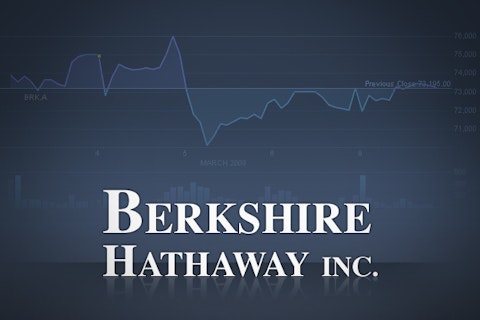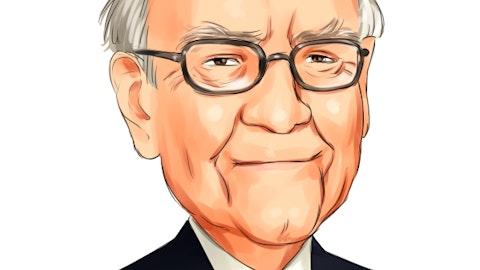For all that is written on the topic, the key to beating the market can be boiled down to a single concept: variant perception. In order to earn a return that is different from the market average, you need to do different things, based on views that are different from the consensus. In that spirit, here are some of the best contrarian articles I’ve read recently.

According to a paper published last November, uncertainty (as measured by the implied volatility of stock options) accounted for half of the decrease in corporate investment and hiring in 2009, the first full year post-Lehman. In December, the CEOs of several blue-chip companies complained about uncertainty relating to the fiscal cliff. That same month, research firm FactSet projected that aggregate capital expenditures for the S&P 500 would fall 1% over the next 12 months.
One corporate chieftain, however, is having none of that. In his annual letter to shareholders, released last Friday, Berkshire Hathaway Inc. (NYSE:BRK.B)‘s Warren Buffett exhorted executives to invest, citing his own example:
There was a lot of hand-wringing last year among CEOs who cried “uncertainty” when faced with capital allocation decisions (despite many of their businesses having enjoyed record levels of both earnings and cash). At Berkshire, we didn’t share their fears, instead spending a record $9.8 billion on plant and equipment in 2012, about 88% of it in the United States. That’s 19% more than we spent in 2011, our previous high. Charlie and I love investing large sums in worthwhile projects, whatever the pundits are saying. We instead heed the words from Gary Allan’s new country song, “Every Storm Runs Out of Rain.”
We will keep our foot to the floor and will almost certainly set still another record for capital expenditures in 2013. Opportunities abound in America.
Buffett went on to extend the recommendation to individual investors:
American business will do fine over time. And stocks will do well just as certainly, since their fate is tied to business performance. Periodic setbacks will occur, yes, but investors and managers are in a game that is heavily stacked in their favor. … Since the basic game is so favorable, Charlie and I believe it’s a terrible mistake to try to dance in and out of it based upon the turn of tarot cards, the predictions of “experts,” or the ebb and flow of business activity. The risks of being out of the game are huge compared to the risks of being in it.
You can read Buffett’s letter in its entirety here. Otherwise, my Foolish colleague Morgan Housel has picked out the highlights in “Warren Buffett on Risk, Optimism and Ketchup.”
Wall Street lies
As any Fool knows, Wall Street constantly resorts to myths, half-truths, and outright falsehoods to prime the pump of investor appetite. The Wall Street Journal‘s esteemable Brett Arends has identified some of the most egregious instances of this in “The 5 Biggest Lies on Wall Street,” including this one, which may surprise you:
Stocks will do well because U.S. corporations are in great shape.
Well, some of them have a lot of cash in the bank. So what? They have a lot of debt, too. According to the Federal Reserve, the total liabilities of U.S. nonfinancial companies just hit a new, all-time high of $13.9 trillion. That’s up 40% from a decade ago. In other words, they owe about the same amount as the federal government. They’ve borrowed more than a trillion in the past three years alone. …OK, so corporate profits are booming. But that’s not a reason to invest more, least of all when those high profits are already factored into high stock prices. In fact, it’s a reason to be worried. Profits can’t keep rising indefinitely as a share of the economy. When they go up, they come back down. According to the U.S. Commerce Department, corporations’ after-tax profits as a share of the economy have been at current levels only a few times in the recorded past. Like in 2006. And 1967. And 1929.
How much are 400 million a tweets a day worth?
Dennis Berman of The Wall Street Journal asks: “Is Twitter Really Worth $10 Billion?” (registration may be required). The answer he found surprised him:
The math in the example above suggests $3.5 billion a year of revenue [by 2016], about where Google was in 2004. And the magic hasn’t kicked in yet. That magic is the value of free labor. The company doesn’t have to pay a cent for the 400 million messages sent each day. As with Facebook, the users willingly, voraciously, do the work gratis. … Companies love touting themselves as “platforms,” but in Twitter’s case it happens to be true. The company must spend to maintain its plumbing and constantly improve its interface, but once that’s done, it stands back and collects its middleman money.
That means getting to massive scale at relatively minimal cost. … For simplicity’s sake, let’s reduce Twitter’s net margins to Google’s, which are a gusher-like 21%. Value all those earnings at Google’s 17-times-trading multiple, and, voila, Twitter has a value of $12.5 billion. And you needn’t tweak conditions much to get a higher number.
No longer the Apple Inc. (NASDAQ:AAPL) of my eye
Shares of Apple Inc. (NASDAQ:AAPL) hit a new low on Monday, losing 2.5% even as the broad market gained 0.5% and putting the market capitalization below $400 billion. The market’s darling through much of last year, Apple Inc. (NASDAQ:AAPL) just can’t seem to catch a break now. Mark Hulbert examines why bad news keeps on coming — and what that means for investors:
With Apple’s stock 36% lower today than its September high, some investors might argue that the current consensus forecast is a case of closing the barn door after the horses have left. Unfortunately, the news is likely to get even worse, according to Michael Clement, an accounting professor at the University of Texas at Austin who has extensively studied analyst behavior. That is because a downward revision is more likely to be followed by yet another downward revision than by an upward one.
Incidentally, when would a contrarian be more interested in Apple Inc. (NASDAQ:AAPL)? When everyone wants to own the shares, or when the stock can’t catch a bid?
Enjoy your week, contrarian Fools.
The article The Top 4 Contrarian Reads originally appeared on Fool.com and is written by Alex Dumortier.
Fool contributor Alex Dumortier, CFA has no position in any stocks mentioned; you can follow him on LinkedIn. The Motley Fool recommends Apple and Berkshire Hathaway. The Motley Fool owns shares of Apple and Berkshire Hathaway.
Copyright © 1995 – 2013 The Motley Fool, LLC. All rights reserved. The Motley Fool has a disclosure policy.





